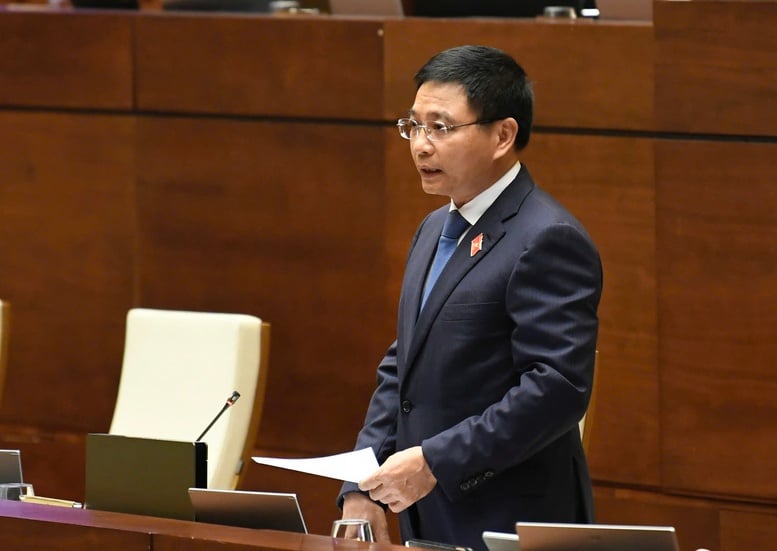
Minister of Finance Nguyen Van Thang answers questions - Photo: VGP/Nhat Bac
On the morning of June 19, the National Assembly conducted a question-and-answer session on a group of issues in the financial sector. The question-and-answer session was led by Minister of Finance Nguyen Van Thang. Deputy Prime Ministers Ho Duc Phoc and Nguyen Chi Dung; Ministers of Industry and Trade, Agriculture and Environment, Construction, Science and Technology, and Foreign Affairs also participated in answering questions and explaining related issues.
Encourage private sector participation in PPP projects
Delegate Dao Chi Nghia (Can Tho Delegation) questioned: Currently, the Party and the State have many policies to create favorable conditions to promote and develop the private economy, especially encouraging strong economic sectors to participate in major projects of the country. What specific solutions will the Ministry of Finance have to advise the Government to encourage the private economy to participate in infrastructure development projects and public services in the coming time?
Minister of Finance Nguyen Van Thang said that the Ministry of Finance has advised the Government to continue submitting to the National Assembly amendments to the provisions of the Law on Investment under the public-private partnership (PPP) method.
Some noteworthy points include: Firstly, minimizing the time for PPP project appraisal and reducing investment policy procedures for some project groups.
Second, empower the competent authority to decide whether or not to establish an Appraisal Council. This helps reduce the time in procedures for implementing PPP investment attraction.
Third, expand the cases of bidding and special selection to meet specific requirements and new requirements when implementing key and urgent projects. This content is very important. Recently, the projects approved by the National Assembly still had to go through bidding procedures while we had already identified investors, which is why it took a lot of time, even a whole year.
Fourth, simplify the requirements and evaluation criteria for investors to create conditions for investors to participate, diversify the fields and forms of public investment cooperation so that enterprises have more choices, promote models such as private investment using public, public investment managing private, public leadership managing private.
Fifth, prioritize the allocation of state budget to prepare for investment, site clearance, risk sharing and balancing resources to participate in key PPP projects. Recently, there have been projects such as the North-South Expressway, Long Thanh Airport... with very new approaches.
Previously, when a business wanted to do a PPP project, it had to invest 100% of its own capital. However, now many projects are participated by the state, even 50-60%.
Sixth, in the field of science and technology alone, the Ministry of Finance is drafting a Decree on PPP in the fields of science, technology, innovation and digital transformation. It is expected to be submitted to the Government for promulgation in June 2025.
Seventh, continue to actively remove difficulties for PPP projects under contracts between the state and enterprises to create trust for enterprises. This is an issue that the public and enterprises are very concerned about.
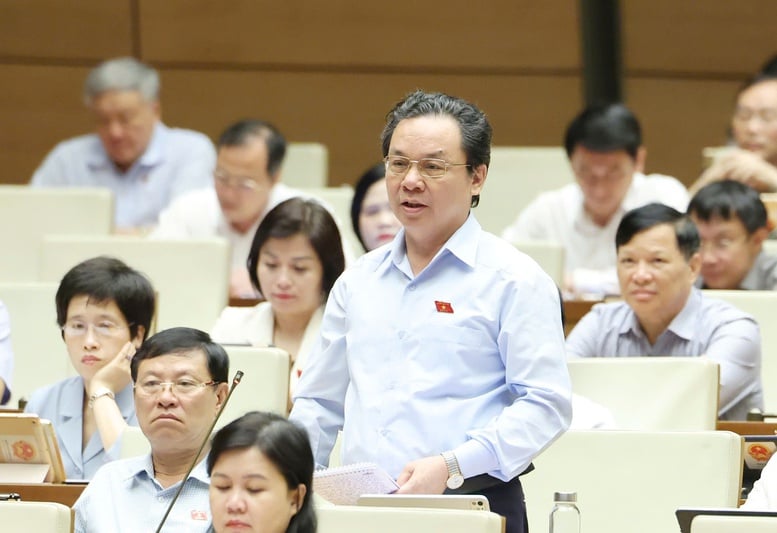
Delegate Hoang Van Cuong (Hanoi Delegation) questions - Photo: VGP/Nhat Bac
Preventing e-commerce tax loss
Delegate Hoang Van Cuong (Hanoi Delegation) questioned: Resolution 68 on private economic development has proposed one of the solutions to develop business households professionally, which is to abolish taxes. Resolution 198 decided to abolish lump-sum taxes for business households from January 1, 2026. This policy is affecting millions of business households with a sense of apprehension. Even during the discussion session in the hall, a delegate proposed to consider and postpone the application of this policy.
This shows that households are not afraid of paying taxes, but are afraid of how to calculate taxes and the correct payment procedures. The delegate asked the Minister: What plans and solutions does the Government have for implementing the new tax collection policy after abolishing lump-sum tax so that business households find it more convenient and enthusiastic in paying taxes?
The Minister of Finance emphasized that currently, our tax system has been assessed by international agencies as basically approaching international practices. However, there are issues related to transparency in some types of taxes that are currently collected manually - this is a major barrier leading to lack of transparency in tax management.
Recently, Resolution 198 of the National Assembly and Resolution 68 of the Politburo requested to abolish the lump-sum tax form, no later than 2026.
Although the tax mechanism was appropriate in certain periods, it has now revealed many shortcomings, lacks transparency, is easily abused, causes inequality among business types, and does not create motivation for business households to grow into small and medium-sized enterprises.
"We consider the abolition of lump-sum tax from 2026 to be the right policy of the State, a fundamental and necessary step to make the activities of business households transparent, create equality in tax regime between business households and enterprises, promote the transition to the enterprise model, and expand the formal economic sector.
This policy, which is a new implementation process, will impact millions of business households. Therefore, we are preparing to synchronize legal, technological, and implementation support, ensuring convenience, reducing procedural burdens and costs for business households. Specifically: Reviewing and perfecting tax policies. The Ministry is proposing to amend the Law on Tax Administration and the Law on Personal Income, aiming for a new tax management model, transparent declaration, and ease of implementation," said the Minister of Finance.
At the same time, simplify books, invoices, and documents to ensure that business households are not under pressure when converting to an enterprise model.
Strengthen digital transformation in tax management, such as applying electronic invoices generated from cash registers, helping to collect correctly and fully, while reducing time and costs for business households. Provide free electronic tax declaration and payment systems, electronic invoice software, accounting software, especially supporting business households that are still facing difficulties in the early stages.
Promote internal digital transformation, improve the quality of public services and enhance tax management capacity, and strengthen data connectivity.
Strengthen communication, training and consulting, such as increasing propaganda and guiding businesses to understand the benefits and how to implement electronic invoices and tax declarations, and organizing training and accounting and tax consulting for businesses.
Recently, the media has closely coordinated with the Ministry of Finance and tax authorities to disseminate and guide business households on this issue.
Delegate Nguyen Huu Thong (Binh Thuan Delegation) pointed out the shortcomings in tax management for business activities on e-commerce platforms and social networks. According to the delegate, tax fraud in this field not only causes loss of state budget revenue but also creates an unhealthy competitive environment for small traders, traditional business households, supermarkets and shopping centers.
The delegate asked the Minister to inform about the implementation of legal regulations on this issue and fundamental solutions to strengthen management of e-commerce activities in the coming time.
Minister of Finance Nguyen Van Thang has proposed many fundamental solutions to combat tax losses from e-commerce. The Minister said that the financial sector has implemented drastic measures to manage taxes in the e-commerce sector and achieved encouraging initial results.
According to the Minister, key solutions include issuing regulations on electronic invoices and tax deduction responsibilities of e-commerce platforms. Individual business households can authorize platforms to create electronic invoices, identify personal numbers selling via social networks. Strongly apply information technology, even artificial intelligence (AI) in management, build electronic portals for tax declaration and payment.
As a result, the Minister said that 95% of population databases have been standardized, connected, and shared information with banks and e-commerce websites.
The Minister said that 158 foreign suppliers have declared and paid taxes, earning VND23,000 billion. Along with that, 106,000 individual business households have declared and paid VND1,200 billion in taxes via the electronic information portal. Tax revenue from e-commerce in the first 5 months of the year increased by 55% with an absolute amount of over VND75,000 billion.
In the coming time, the Ministry of Finance will continue to perfect regulations, clearly identify organizations and individuals doing e-commerce business; upgrade electronic portals and especially use AI to warn of tax fraud, and review individuals with income arising from digital platforms.
Difficulties and challenges in building an international financial center
Delegate Tran Chi Cuong (Da Nang Delegation) said that, implementing the direction of competent authorities, the Government has submitted to the National Assembly a draft resolution on the International Financial Center. Could the Minister please tell us about the difficulties and challenges in the process of developing these mechanisms and policies to effectively implement the National Assembly's resolution?
Responding to this issue, Finance Minister Nguyen Van Thang said that building an international financial center in Vietnam is a very difficult and complicated task, covering many areas. Vietnam's current laws still have many gaps when compared to the requirements of an international standard financial center.
Regarding difficulties, the International Financial Center needs a flexible and superior legal and institutional environment, but is currently entangled in current laws, requiring a mechanism to allow controlled piloting, along with a risk assessment mechanism.
Some policies such as capital flow liberalization, foreign exchange transactions, development of new financial products, fintech, digital assets, derivative transactions, etc. still have many concerns about the ability to control risks.
Our country also lacks experience in coordinating management and coordination between fields such as finance, banking, justice, customs, police, etc.
In the coming time, we need to promptly issue guiding decrees, select locations to design an effective international financial center management organization model, build a sandbox mechanism to test controlled new financial products, crypto assets, green finance... while still ensuring the principles of system safety.
Policy dialogue with major financial institutions, Financial Center takes the lead to continue to improve
Implement national communication strategy, promote investment, promote Vietnam International Financial Center as a reliable, transparent and sustainable destination.
Phuong Lien
Source: https://baochinhphu.vn/quyet-liet-quan-ly-thue-trong-linh-vuc-thuong-mai-dien-tu-10225061911244769.htm








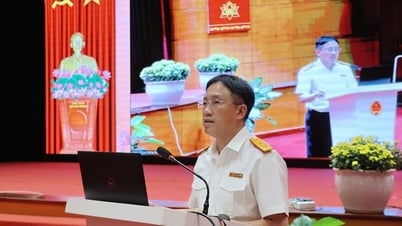
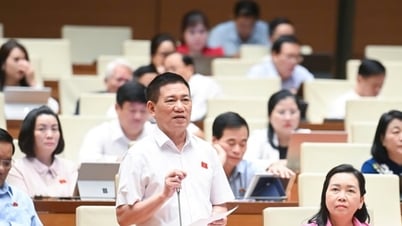



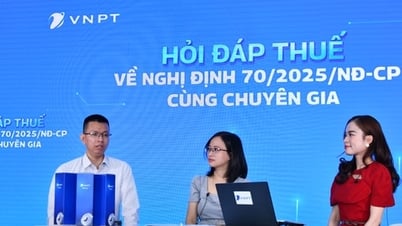



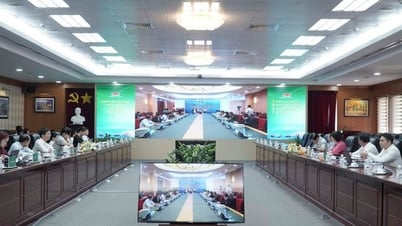
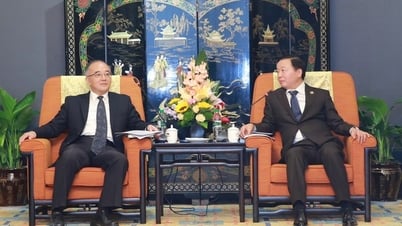


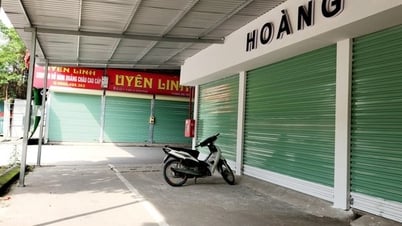
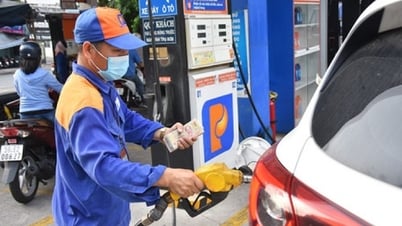






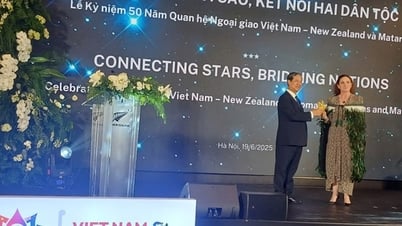
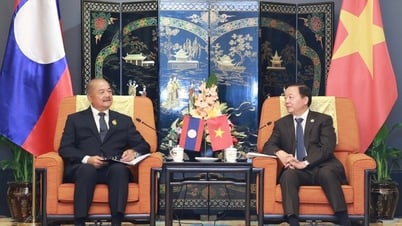

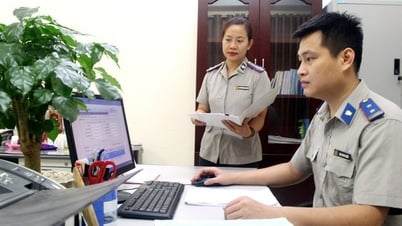
































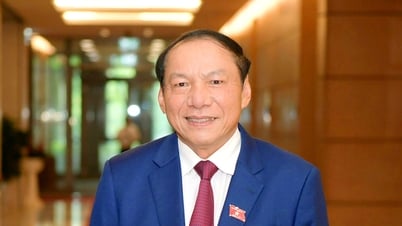








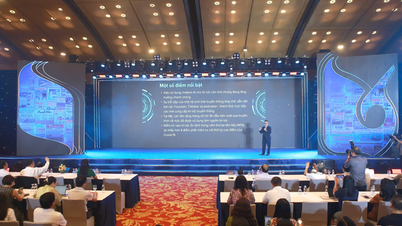










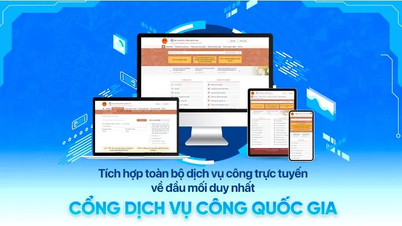

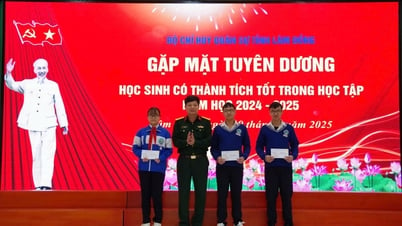

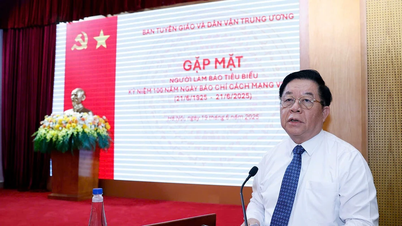

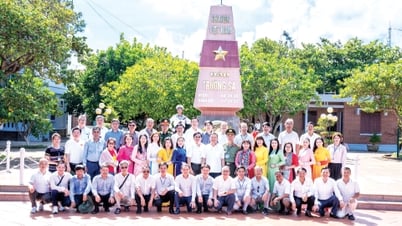















Comment (0)